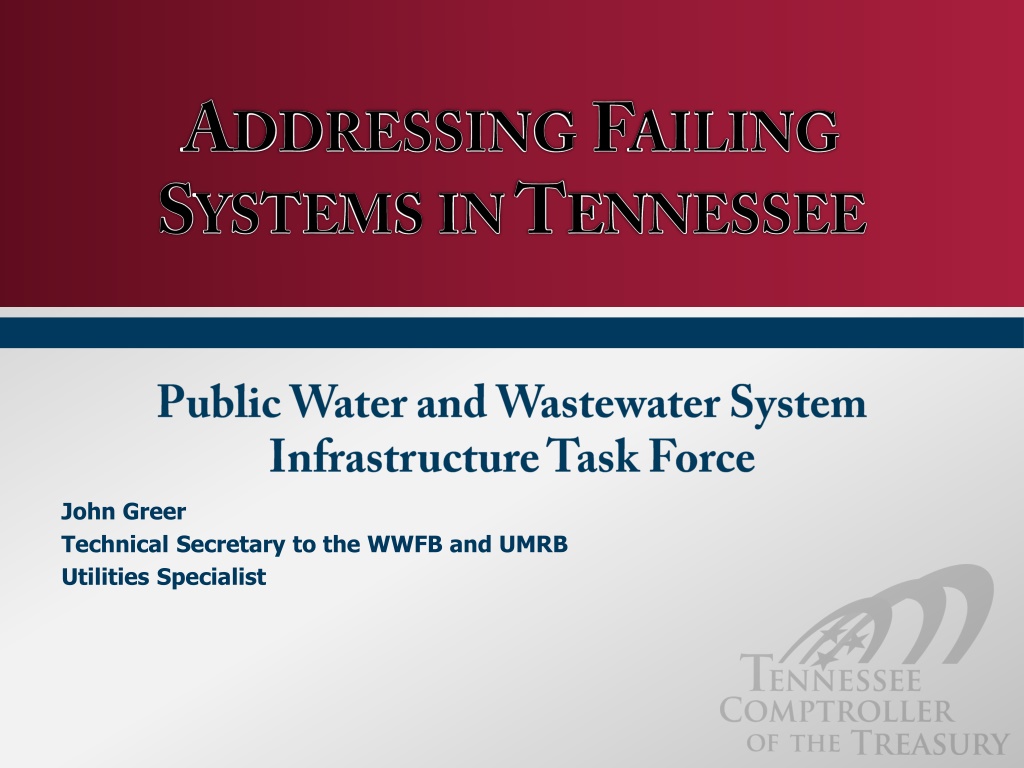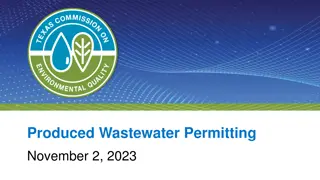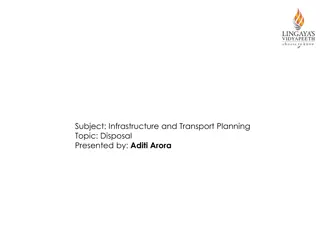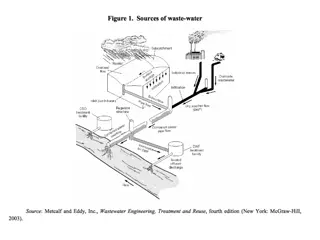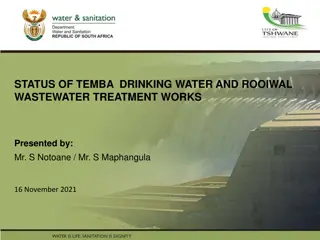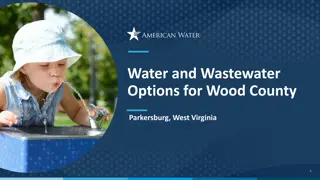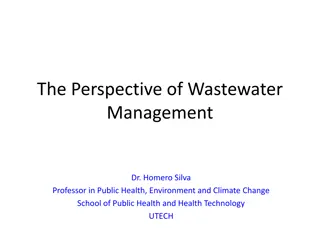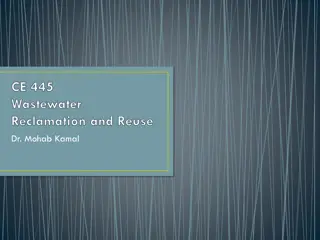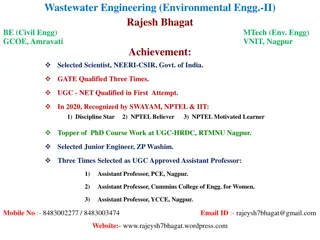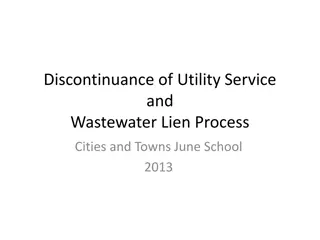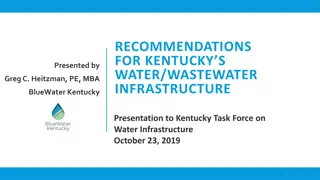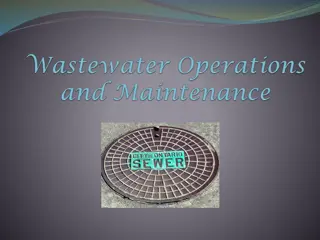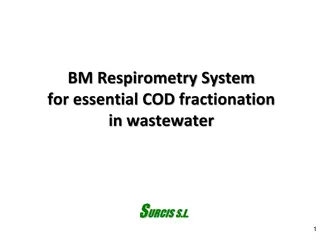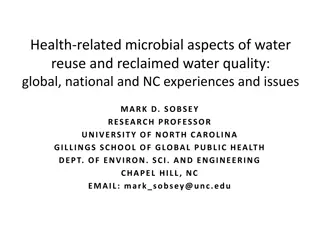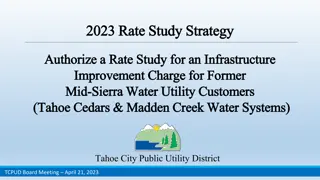Overview of Water and Wastewater Financing Board (WWFB) and Utility Management Review Board (UMRB)
The Water and Wastewater Financing Board (WWFB) and Utility Management Review Board (UMRB) are essential bodies in Tennessee, overseeing water and wastewater infrastructure, management, and financing. Comprised of members from various sectors, they ensure effective governance and representation across the state. The boards play a crucial role in supervising utility districts, municipalities, and counties, with a focus on promoting accountability, sustainability, and efficient operations within the water and wastewater sector.
Download Presentation

Please find below an Image/Link to download the presentation.
The content on the website is provided AS IS for your information and personal use only. It may not be sold, licensed, or shared on other websites without obtaining consent from the author. Download presentation by click this link. If you encounter any issues during the download, it is possible that the publisher has removed the file from their server.
E N D
Presentation Transcript
John Greer Technical Secretary to the WWFB and UMRB Utilities Specialist
Justin P. Wilson Comptroller Administration, Legal & Public Affairs Research & Education Accountability Property Assessments StateAssessed Properties State Boardof Equalization Management Services Technology Solutions Local Government Audit State &Local Finance StateAudit Investigations
Water and Wastewater Financing Board (WWFB) Utility Management Review Board Created in 1987 In 2007 moved administratively from Tennessee Department of Environment and Conservation (TDEC) to Comptroller of the Treasury (COT)
Municipalities (260) Counties (12) Authorities (10) Water and Wastewater only
Utility Districts (179) Water Wastewater Natural Gas Fire
9 members 2 ex-officio 7 appointed by Governor All grand divisions of Tennessee represented
9 members 2 ex-officio 7 appointed by Governor All grand divisions of Tennessee represented
Comptroller Designee (Chair) TDEC Designee
Two members representing utility districts Two members representing municipalities One member representing government finance One member representing manufacturing interest One member representing environmental interest
Three Utility Managers Three Utility Commissioners One Consumer Representative
PICKETT CLAY ROBERTSON MACON HAWKINS MONTGOMERY STEWART SUMNER CAMPBELL FENTRESS SCOTT CARTER HENRY OVERTON JACKSON OBION WEAKLEY UNION HOUSTON SMITH GREENE WILSON PUTNAM DAVIDSON DICKSON DYER MORGAN JEFFERSON HUMPHREYS KNOX GIBSON CARROLL DEKALB WHITE COCKE CUMBERLAND WILLIAMSON RUTHERFORD SEVIER ROANE HICKMAN LOUDON BLOUNT WARREN HENDERSON MADISON BLEDSOE HAYWOOD MAURY RHEA PERRY TIPTON LEWIS BEDFORD COFFEE CHESTER MONROE MCMINN GRUNDY WAYNE FAYETTE SHELBY GILES HARDEMAN MCNAIRY HARDIN BRADLEY LAWRENCE HAMILTON FRANKLIN POLK LINCOLN MARION
PICKETT CLAY ROBERTSON MACON HAWKINS MONTGOMERY STEWART SUMNER CAMPBELL FENTRESS SCOTT CARTER HENRY OVERTON JACKSON OBION WEAKLEY UNION HOUSTON SMITH GREENE WILSON PUTNAM DAVIDSON DICKSON DYER MORGAN JEFFERSON HUMPHREYS KNOX GIBSON CARROLL DEKALB WHITE COCKE CUMBERLAND WILLIAMSON RUTHERFORD SEVIER ROANE HICKMAN LOUDON BLOUNT WARREN HENDERSON MADISON BLEDSOE HAYWOOD MAURY RHEA PERRY TIPTON LEWIS BEDFORD COFFEE CHESTER MONROE MCMINN GRUNDY WAYNE FAYETTE SHELBY GILES HARDEMAN MCNAIRY HARDIN BRADLEY LAWRENCE HAMILTON FRANKLIN POLK LINCOLN MARION
Purpose (Tenn. Code Ann. 68-221-1007) To correct financial losses Reasonable user rate increases (expense decreases) Negotiate consolidations Legislative Objective (Tenn. Code Ann. 68-221- 1008) Self-supporting water and wastewater facilities Act for the public welfare
Legislative directive (Tenn. Code Ann. 7-82-706) Act for the public welfare Carry out the General Assembly s intent that utility districts be operated as self-sufficient enterprises.
Regulatory Procedures Formal Review Board Investigation Informal Hearing Contested Case Litigation
How does an entity get referred? All government utilities in Tennessee must submit an audit to our office annually Audits are performed by independent CPA firms or by our office for county systems Tennessee requires the AWWA free reporting worksheet to be included in the audit
What gets an entity referred? Financial 2 years with a negative change in net position Deficit total net position Default on any debt instrument Water Loss Validity score of 80 or less or non-revenue water as a percent by cost of operating system of 20% or greater
What gets an entity referred? 2 years with a regulatory loss Revenues minus expenses minus grants and capital contributions We also take out all pension assets and liabilities
What gets an entity referred? Training All utility board members in Tennessee are required to receive training The UMRB can remove board members who fail to meet the training requirement The WWFB can impose reasonable sanctions including the loss of funding through the State Revolving Fund
Education Two-way street Technical Assistance Board members
Collaboration with local, state and federal agencies Tennessee Department of Environment State Revolving Fund Economic and Community Development United States Department of Agriculture Tennessee Association of Utility Districts Tennessee Municipal League
Financial Planning Build long term plans Share information about the resources available Managerial Assistance Tough Decisions
We are able to help utilities through our informal proceedings
25 John Greer Utilities Specialist Technical Secretary to the Boards Comptroller of the Treasury Division of Administration Cordell Hull Building 425 Fifth Avenue North Nashville, Tennessee 37243 Phone: (615) 747-5260 utilities@cot.tn.gov
